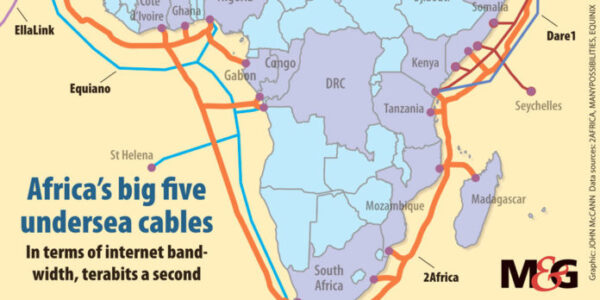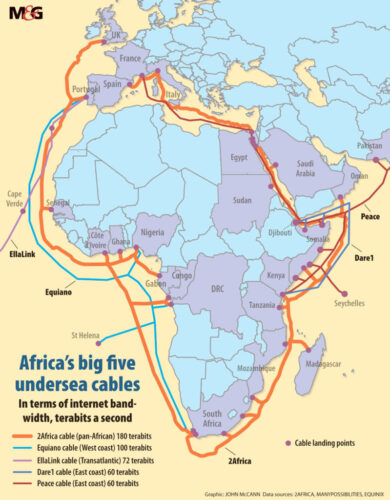PBS: Escaping Eritrea … [Read More...] about ካብ ውሽጢ ቤት ማእሰርታት ኤርትራ
Inside Facebook’s big bet on Africa
Matthew Du Plessis | 25 May 2020 | Mail & Guardian

Last week Facebook unveiled its 2Africa undersea cable project, which will circle the continent, connecting it to Europe and the Middle East. When it is operational in 2023 it will increase bandwidth to the continent by a massive 180 terabits per second.
The 2Africa consortium sees Facebook partnering with established carriers such as MTN, Vodafone, China Mobile, Orange and others, who will bring the cable’s connectivity to 16 countries in Africa, some of which have not had direct access to international bandwidth before.
With other projects such as Google’s Equiano cable in the pipeline, this capacity boost should also lead to higher speeds and lower prices, and expand coverage deeper into under-served areas beyond major cities.
Ibrahim Ba, the emerging markets lead at Facebook’s Network Investments says the 2Africa cable will triple existing capacity. “And in terms of resilience, the cable will in certain areas be buried 50% deeper than other cables, which will help ensure there aren’t too many cuts in connectivity.”
According to Ben Roberts, the chief technologist of Liquid Telecom — a leading connectivity services provider across eastern, central and Southern Africa — it’s not the additional capacity that will have the most impact on the continent, but rather the additional infrastructure and competition that comes along with it.
“Currently the cables we already have are not yet full,” he said. “But what the 2Africa cable is capable of doing is connecting the unconnected. Not all African countries have been well connected by the existing cables. Northern Mozambique, for example, requires reliable high speed internet support for the buyers of the new oil and gas reserves there. And then we go and look at 2Africa and what do we see? Northern Mozambique. There are new connections to Somalia and other places where there isn’t great connectivity — and then others where there’s a lack of competition such as the Democratic Republic of the Congo and West African countries that currently have very few cable landings. So, it’s bringing in additional competition into the markets, and greater diversity.”
“This is really for the long term,” Ba added. “And Facebook can’t do it by itself, it’s a concerted effort with major operators, governments and everyone else who is able to pitch in. We’re one part of that puzzle.”
Net Neutrality
It’s a puzzle that has changed somewhat since the first undersea cables connected Africa nearly 20 years ago. Then, they were driven by investments by governments or telecommunications carriers, but now companies like Google and Facebook are in the driver’s seat, and there are concerns that this may lead to anti-competitive behaviour, especially as there are few, if any, net neutrality laws in the region as there are in the United States and Europe. So in theory it could be possible for a company who controls a cable’s capacity to privilege access to their services over another’s. For example, if a country is served only by the 2Africa cable, will this mean that videos on Facebook will load very quickly there, but YouTube videos or Netflix will be very slow, if they load at all?

According to Ba, that would not be in Facebook’s interest. “This cable is not about making Facebook products or videos faster than the competitors,” he told The Continent. “It is about improving the performance of our product. Obviously we want to improve the profile of our product, so yes we and our partners are providing that capacity — but it’s open access. Anyone else can access the capacity and the speed, and they can improve their own products and services. So I don’t think this is designed for a competitive advantage.”
Roberts agreed that gatekeeping would not be in Facebook’s interest, certainly not as far as terrestrial infrastructure is concerned.
“We have had situations where gatekeeping has happened because there is limited access to markets, where bandwidth prices are still too high. What 2Africa is aiming to do is open some of those up. South Africa and Kenya, have a good number of cables coming in being spread, shared across multiple parties. So you’ve got pretty low pricing, and as more cables land you’ll start to see that low pricing elsewhere too.
Facebook has actively sought to avoid entrenching practices such as carrier monopolies, said Ba. “Every consortium member can land the cables and provide access to its data centre,” he said. “But those data centres will be regulated in a way they have to provide access to any operator on a fair and equitable basis. That will support competition, which is critically important to Facebook and also reflects how we do business on the continent. If you look at all of the fiber projects that we’ve done, they’re all open access.”
However there is a risk that the consortium partners such as MTN, Vodafone and others will still have a competitive advantage, according to cable connectivity analyst Sunil Tagare of OpenCable.com. “This deal is probably the second best thing that could have happened. Ideally the smaller carriers would also have been part of the deal. So hopefully these seven or eight carriers will start filling capacity and there will be some kind of a price trickle-down.”
Good for the continent
Node Africa CEO Phares Kariuki is a technologist who has advised the Kenyan government on cable connectivity projects. Although he has reservations about the social media giant, he believes the 2Africa cable bodes well for the continent.
“Facebook is a problematic company in many ways, Kariuki told The Continent this week. “I don’t agree with what they’re doing around Facebook Zero [in which providers waive data charges for accessing Facebook on phones via a text-only version of its mobile site] because it works against net neutrality. However, this is a particularly well designed policy initiative, at least on the surface.”
“I haven’t seen the actual contract, so I couldn’t say if any mischief is hidden between the lines,” he added, “But from a design perspective, this is what I believe Google should have done instead of experimenting with balloons [in its Loon project piloted in Kenya, among other countries around the world, which delivers high-speed wireless connectivity via high-altitude balloons in the stratosphere.]
“For the countries that have not had the luxury of proper connectivity, especially in West Africa, this cable completely solves that. It has multiple paths to Europe where most of the major internet exchanges are. And it’s landing here at carrier neutral facilities, so you don’t have to start fighting with ISPs to gain access to the bandwidth.
“On the face of it this appears to be exactly what is needed to drive down costs,” said Kariuki. For the countries that have not had the luxury of proper connectivity, this cable will solve that problem. It’s what Google, Microsoft or Amazon should have done years ago.”
